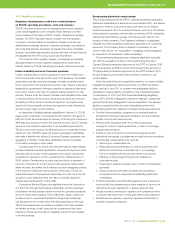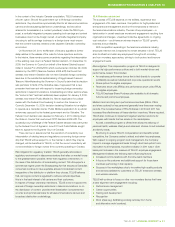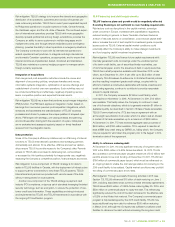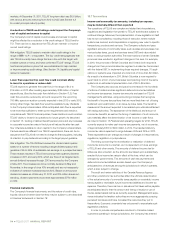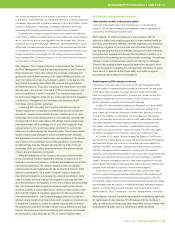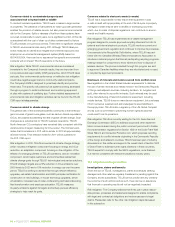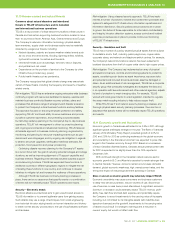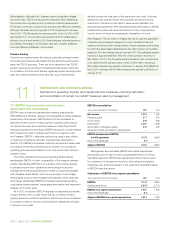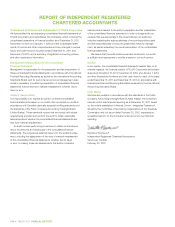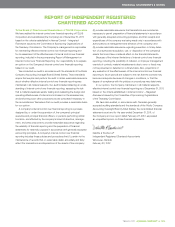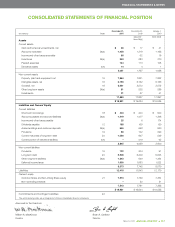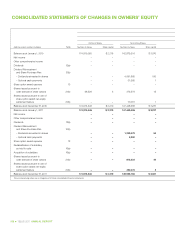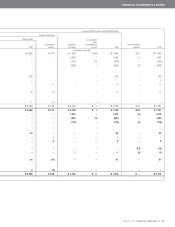Telus 2011 Annual Report Download - page 103
Download and view the complete annual report
Please find page 103 of the 2011 Telus annual report below. You can navigate through the pages in the report by either clicking on the pages listed below, or by using the keyword search tool below to find specific information within the annual report.
TELUS 2011 ANNUAL REPORT . 99
MANAGEMENT’S DISCUSSION & ANALYSIS: 10
10.10 Human-caused and natural threats
Concerns about natural disasters and intentional
threats to TELUS’ infrastructure and its Canadian
and international business operations
TELUS is a key provider of critical telecommunications infrastructure in
Canada and has certain supporting business functions located in more
than 10 countries in North America, Asia, Central America and Europe.
The Company’s networks, information technology, physical assets,
team members, supply chain and business results may be materially
impacted by exogenous threats, including:
.Natural disasters, seismic and severe weather-related events such
as ice, snow and wind storms, flooding, lightning strikes, wildfires,
typhoons/hurricanes, tornadoes and tsunamis
.Intentional threats such as sabotage, terrorism, labour disputes,
and political and civil unrest
.Dependence on the provision of service to the Company by other
infrastructure providers (e.g. power)
.Public health threats such as pandemics.
The Company recognizes that global climate change may exacerbate
certain of these threats, including the frequency and severity of weather-
related events.
Risk mitigation: TELUS has an extensive ongoing enterprise-wide business
continuity program with resources dedicated to develop, exercise and
maintain business continuity/disaster recovery policies, plans and
pro cesses that address a range of emergency and disaster scenarios
to protect the Company’s critical business functions and key facilities.
This approach focuses on ensuring employee protection and safety,
sup porting TELUS’ continued ability to serve customers and provide
a positive cus tomer experience, and protecting corporate assets
by insti tuting resil iency planning in the Company’s day-to-day business
operations. TELUS’ risk management is driven by proactive planning
and ongoing environ mental and situational monitoring. TELUS takes an
all-hazards approach to business continuity planning, aug mented by
monitoring and planning for resource-impacting events such as pan-
demics and work stoppages, and by ongoing risk mitigation in regards
to seismic structural upgrades, earthquake-readiness exercises, fire
protection, flood prevention and power provisioning.
Optimizing disaster recovery planning for the Company’s IT assets
is a
current focus with the goal of reducing potential outages and outage
dura tions, as well as improving alignment of IT support capa bility and
business demand. Regarding internationally situated business support
and outsourcing functions, TELUS has expanded these functions to
additional countries in different geographic regions to mitigate the risk
of locating these functions in one country, and continues to develop
initiatives to mitigate risk and increase the resilience of these operations.
Although TELUS has business continuity planning processes in
place, there can be no assurance that specific events or a combination
of events will not materially impact TELUS operations and results.
Security – Electronic attack
Electronic attacks are intentional acts to gain unauthorized access to
TELUS information or to prevent legitimate users from gaining access.
Such attacks may use a range of techniques, from social engineering
(non-technical intrusion relying heavily on human interaction and trickery
to break normal security procedures) to the use of sophisticated software
and hardware.
Risk mitigation: Using a layered security approach, TELUS has imple-
mented a number of proactive, reactive and containment processes and
systems to safeguard its IT infrastructure, information repositories and
information distribution. Security policies and procedures are in place
to govern the duties of those responsible for information confidentiality
and integrity. Intrusion detection systems, access controls and incident
response procedures are in place to provide continuous monitoring
of TELUS’ IT infrastructure.
Security – Vandalism and theft
TELUS has a number of publicly situated physical assets that are subject
to vandalism and/or theft, including public payphones, copper cable,
corporate stores, and network and telephone switch centres. For example,
the Company’s telecommunications network has been subjected to
localized disruptions from theft of copper cable due to high copper prices.
Risk mitigation: The Company has implemented an array of physical
and electronic barriers, controls and monitoring systems to protect its
assets, considering such factors as asset importance, exposure risks
and potential costs incurred should a particular asset be damaged or
stolen. As an additional level of risk management, TELUS has a corporate
security group that continually investigates and evaluates the risks and,
in co-operation with law enforcement and other external agencies, adjusts
its level of protection to meet changing risks. For example, TELUS
worked with local governments to enact legislation intended to regulate
the scrap metal recycling industry to help reduce copper theft.
While TELUS has IT and network security planning processes, and
thorough physical asset security planning processes, there can be no
assurance that specific events will not materially impact TELUS operations
and results.
10.11 Economic growth and fluctuations
Economic growth in Canada was estimated to be 2.4% in 2011, although
significant global challenges emerged in the year. The Bank of Canada’s
January 2012 Monetary Policy Report projected growth of 2.0% for
2012 and 2.8% for 2013 as continuing weakness in the global economy
and uncertainty in the financial environment are expected to pose
chal-
lenges to the Canadian economy through 2012. Based on a consensus
of major Canadian chartered banks, Canada’s annual unemployment rate
for 2012 is expected to be slightly lower than the 7.5% reported in
December 2011.
With continued strength in the Canadian natural resource sector,
economic growth in B.C. and Alberta is expected to remain stronger than
in Central Canada. However, concerns remain around weak domestic
demand, global economic weakness, high unemployment rates, and the
timing and impact of reduced government spending in Canada.
Slow or uneven economic growth may adversely impact TELUS
Economic uncertainty may cause consumers and business customers
to delay new service purchases, reduce volumes of use, discontinue
use of services or seek lower-priced alternatives. A significant economic
downturn or recession could adversely impact TELUS’ revenue, profit-
ability, free cash flow and bad debt expense, and potentially require
the Company to record impairments to the carrying value of its assets
including, but not limited to, its intangible assets with indefinite lives
(spectrum licences) and its goodwill. Impairments to the carrying value
of assets would result in a charge to earnings and a reduction in
owners’ equity, but would not affect cash flow.


